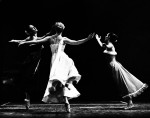Title
When the Alumni Office asked members of the Beyond the Stage group for alums in nonperforming careers to send their news to The Journal, the number of responses was overwhelming. We started printing that news in the November Journal and will continue to do so in the coming months. Here, two alums describe their very different spiritual journeys.
Body
At Juilliard, Irini Nute Rockwell (B.S. ’67, dance) majored in modern dance and minored in ballet, but after graduation, she journeyed across the country, where eventually she pursued a new spiritual path. In 1969, she moved to the Bay Area, where she co-created a collective that focused on experimental work, taught at Berkeley, and formed a company called Footloose. “Yet, I felt there was something missing, and in the late 1970s, Buddhism became a beacon for my life journey,” she wrote. “For several years, I felt as though I had danced myself into stillness. I lived on unemployment as much as I could, practiced and read about Buddhism during the day, and taught workshops in movement theater in the evenings.” By the 1980s, she was heading the movement studies department at the Naropa University in Boulder, Colo., but before long, she had decided to pursue a master’s degree in contemplative psychotherapy and wrote a book called The Five Wisdom Energies, a Buddhist Understanding of Personalities, Emotions and Relationships. In subsequent years, she tried to combine Buddhism with her dance work and other aspects of her life, and now gives lectures and is a senior teacher in the Shambhala community with a new book, Natural Brilliance: A Buddhist System for Uncovering Your Strengths and Letting Them Shine, coming out in March. “I feel that everything I have done has led me to this. Cultivating a sense of excellence was instilled in me at Juilliard. For me, this does not only apply to dance but rather, as they say in Bali, ‘We have no art; we do everything as well as possible’.”
After playing viola professionally for a few years in New York City, Don Krishnaswami (Pre-College ’81; B.M.’84, composition; M.M. ’88, viola) decided move to Boston and work full-time for his church denomination. “For a time I enjoyed being involved in the very different world that an office environment offers from that to which a musician is typically accustomed,” he wrote. “But then I began to feel a void, though surely, I thought, there was no higher calling—even that of music—than to work for God and one’s church. Yet the pangs of missing my profession, the one I had trained for since the age of 7, grew more and more.” After hearing a radio discussion about the Beethoven cello sonatas, he decided to start pursuing music again, soon landing freelance work, and after a couple of years, decided to quit his day job altogether. “I knew that I had to do it if I was seriously to engage in my profession again.” For the last 13 years, he has been a full-time musician, performing with the Boston Pops, Boston Symphony, Boston Ballet Orchestra, Boston Lyric Opera Orchestra, and others as well as teaching and composing. “I am very grateful to have settled into the life-calling that is exactly right for me—the musician that simply cannot be put down,” Krishnaswami said. “Music can be one’s ultimate and highest spiritual calling: the musician in me is a force too powerful to deny, and it took leaving my profession for a time to learn this.”





